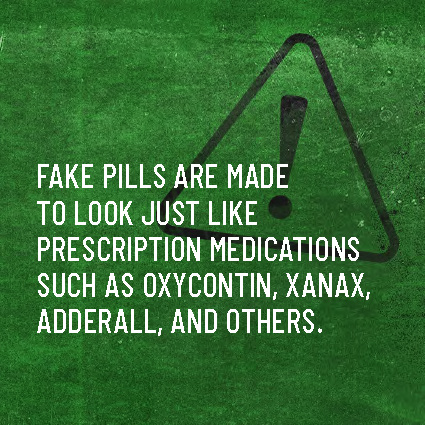You’ve probably heard about opioids in the news, from friends, or maybe in school, but what exactly are opioids, and why should you care? The information below can help you get the facts about opioids, take control of your health, and maybe even save a life.
What are opioids?
“Opioids” is the proper term, but opioid drugs may also be called opiates, painkillers, or narcotics. Some opioid medications are made from the poppy plant, while others are made by scientists in a lab. Opioids include prescription medications used to treat pain, as well as fentanyl and heroin.
Prescription opioids or pills are prescribed by doctors to treat really bad pain such as a sports injury, dental work, or cancer. When taken as prescribed, they are reasonably safe and can reduce someone’s pain in the short term. But even while they are prescribed by a doctor, they do have serious risks and side effects, especially when misused or not taken as prescribed. Common types of prescription opioids include oxycodone (OxyContin), hydrocodone (Vicodin), morphine, Percocet, and codeine.
Heroin is an illegal, highly addictive opioid that is typically injected but can also be snorted or smoked. It is typically sold as a white or brownish powder, but also sold as “black tar” heroin which is sticky like roofing tar or hard like coal.
Fentanyl is a powerful synthetic opioid that is similar to morphine but is 50-100 times more powerful. Medically, it is used to treat severe pain, including during or after surgeries. However, it is now being made illegally and sold on the streets for its “heroin-like” effect. It is often mixed with heroin, cocaine, marijuana, imitation or fake pills, and other drugs — with or without the knowledge of the individual who is taking it. You can learn more in our blog ‘Get the Facts on Fentanyl’.
Fake Pills and Fentanyl


How do opioids affect you?
All opioids work in a similar way - they latch onto certain nerve cells in your brain and body called opioid receptors, blocking pain signals. Whether they’re prescribed by a doctor or bought illegally, opioids can make some people feel euphoric or “high.” That’s why opioids, even the ones you get from a doctor, can be super addictive.
Physical dependence: Your body can quickly become dependent on opioids, meaning you need more of the drug to feel the same effects.
Risk of overdose: Taking too much of an opioid can slow down your breathing to the point where it stops altogether, leading to overdose and potentially death.
Side effects: Even when taken as prescribed, opioids can cause sleepiness, relaxation, euphoria, dizziness, constipation, nausea, and slowed breathing. Over time, they can also lead to more severe issues like liver damage and heart problems.
Why should you care?
Opioid misuse can happen to anyone. It might start with a prescription after an injury or surgery, or perhaps a pill taken at a party, but things can get out of hand fast. Even if you don’t think you’re at risk, it’s important to stay aware — especially with the rise of fentanyl-laced fake pills that look like common prescription drugs. These fake pills are being sold everywhere, and even a tiny amount of fentanyl can be deadly.
What can you do?
The topic of opioids isn’t just about the person using them; it affects their friends, families, and communities, too. Knowing the risks, how to help, and staying informed can help keep you and your loved ones safe.
Educate yourself: Knowledge is power. Understanding how opioids work, the risks involved, and how to recognize and respond to an overdose can help you make informed decisions.
Use of prescription medications responsibility: If you’re prescribed an opioid, follow your doctor’s instructions carefully. Don’t take more than directed, and never share your medication with others. If you are using pills that have not been prescribed to you and were purchased on the street, be aware that they may contain fentanyl. If you are unsure, it’s best to test your drugs with a fentanyl test strip.
Seek help if needed: If you or someone you know is struggling with substance use, don’t hesitate to seek help. There are resources available, from hotlines to treatment centers.
Spread awareness: Talk about what you’ve learned with friends and family. The more people know about the risks of opioids and how to recognize and respond to overdose, the better equipped we’ll all be to handle situations involving these substances.
Where and how to get help for a substance use problem
If you or someone you know needs help, you can call SAMHSA’s national helpline at 1-800-622-HELP (4357).
- The helpline is free, private, and available 24 hours a day/7 days a week for individuals and families experiencing mental health or substance use challenges.
- They can provide referrals and information on local resources, facilities, support groups, and community-based organizations.
- You will not be asked or required to give any personal information.
You can also visit their website at Samhsa.Gov, or send your zip code via text message to 435748 (HELP4U) to find help near you.
For more information on available resources, check out our Get Help page.
